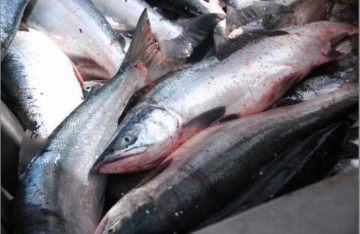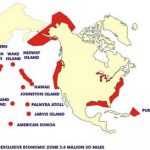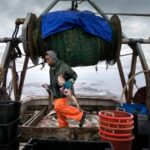Single-day catch of 1 million sockeye buoys Nushagak fishermen in Bristol Bay
 A million salmon caught in a day isn’t unheard of in the wildly productive Bristol Bay commercial fishery, but for one district it proved to be a record. Whether the early bonanza is a harbinger of a strong season, though, remains to be seen. Commercial fishermen in Bristol Bay’s Nushagak district caught a little over 1 million prized sockeye salmon Monday, the largest single-day catch in the Nushagak fishery. Typically, Bristol Bay catches peak around July 4. While million-plus days have happened in other Bristol Bay fisheries, they’re rarely seen in the Nushagak, a smaller fishery than the Naknek-Kvichak district to the east. The bay, considered the premier red salmon fishery in the country, is divided into five management districts based on the nine major river systems in the region. click here to read the story 17:17
A million salmon caught in a day isn’t unheard of in the wildly productive Bristol Bay commercial fishery, but for one district it proved to be a record. Whether the early bonanza is a harbinger of a strong season, though, remains to be seen. Commercial fishermen in Bristol Bay’s Nushagak district caught a little over 1 million prized sockeye salmon Monday, the largest single-day catch in the Nushagak fishery. Typically, Bristol Bay catches peak around July 4. While million-plus days have happened in other Bristol Bay fisheries, they’re rarely seen in the Nushagak, a smaller fishery than the Naknek-Kvichak district to the east. The bay, considered the premier red salmon fishery in the country, is divided into five management districts based on the nine major river systems in the region. click here to read the story 17:17













































No no …. that’s ok…. the rest of the ENTIRE friggen coast didn’t want to catch any sockeye anyway. This is why OUR fisherman can’t catch any here in B.C.
SMH
SMFH
This is the age of severely failing wild seafood stocks around the world. Due to drastic, and historically low Sockeye stocks, the Skeena River in British Columbia is closed to all commercial and Sport fish activity, and Native Food-Fishers have decided that in the interest of preserving salmon stock, they will not fish salmon in the Skeena River this year.. Overall the numbers of salmon returns on the west coast are down dramatically. So, in light of these relatively well known truths, where is the common sense quotient in the very loose approach to the management of the Commercial Salmon Fishery in the area of Bristol Bay.
“This is the age of severely failing wild seafood stocks around the world.” This is simply not true! Please see below for some reading on stock population myths.
From CFOODuw.org: http://cfooduw.org/myths/
and specifically
http://cfooduw.org/myths/70-of-the-worlds-fish-stocks-are-overfished/
“Daniel Pauly and colleagues at the Sea Around Us Project have repeatedly claimed 70% of world fish stocks are overexploited. They use catch data only and assume that any stock whose catch is less than ½ of the maximum catch that occurred earlier was overfished.”
“The Food and Agriculture Organization of the United Nations assess the status of stocks and estimate that about 30% of global fish stocks are overexploited.”
“This is the age of severely failing wild fish stocks around the world.”
Nope, simply not true! Please stop perpetrating this myth! This kind of misinformation is destructive to many peoples’ lives and actually disruptive to balances in the ocean ecosystem, not to mention undermining an abundant source of fresh local healthy chemical-free food! Please see links below for some reading on this and other pervasive status of fish stock myths.
From CFOODuw.org
(http://cfooduw.org/public-perception-of-the-ocean/)
(http://cfooduw.org/myths/)
and specific to the statement quoted above:
http://cfooduw.org/myths/70-of-the-worlds-fish-stocks-are-overfished/
“Daniel Pauly and colleagues at the Sea Around Us Project have repeatedly claimed 70% of world fish stocks are overexploited. They use catch data only and assume that any stock whose catch is less than ½ of the maximum catch that occurred earlier was overfished. (Bogus methodology)
(However)
“This conclusion and entire approach have been subject to a long string of criticisms. The Food and Agriculture Organization of the United Nations assess the status of stocks and estimate that about 30% of global fish stocks are overexploited.”
And “overexploited” does not mean “failing”. It indicates a management response is inevitable.
“This is the age of severely failing wild fish stocks around the world.”
Nope, simply not true! Please stop perpetrating this myth! This kind of misinformation is destructive to many peoples’ lives and actually disruptive to balances in the ocean ecosystem, not to mention undermining an abundant source of fresh local healthy chemical-free food! Please see links below for some reading on this and other pervasive status of fish stock myths.
From CFOODuw.org
http://cfooduw.org/public-perception-of-the-ocean/
http://cfooduw.org/myths/
and specific to the statement quoted above:
http://cfooduw.org/…/70-of-the-worlds-fish-stocks-are-over…/
“Daniel Pauly and colleagues at the Sea Around Us Project have repeatedly claimed 70% of world fish stocks are overexploited. They use catch data only and assume that any stock whose catch is less than ½ of the maximum catch that occurred earlier was overfished. (Bogus methodology)
(However)
“This conclusion and entire approach have been subject to a long string of criticisms. The Food and Agriculture Organization of the United Nations assess the status of stocks and estimate that about 30% of global fish stocks are overexploited.”
And “overexploited” does not mean “failing”. It indicates a management response is inevitable.
Also “fully exploited” is not a sign of impending apocalypse either, it happens to be the management goal “…for wild fish stocks around the world”. The universal use of the management postulate of Maximum Sustainable Yield is the “full exploitation” of food fish stocks while maintaining regenerative integrity.
“This is the age of severely failing wild fish stocks around the world.”
In response to that statement in the comment below: Nope, simply not true! Please stop perpetrating this myth! This kind of misinformation is destructive to many peoples’ lives and actually disruptive to balances in the ocean ecosystem, not to mention undermining an abundant source of fresh local healthy chemical-free food! Please see links below for some reading on this and other pervasive fish stock myths.
From CFOODuw.org
http://cfooduw.org/public-perception-of-the-ocean/
(http://cfooduw.org/myths/)
and specific to the statement quoted above:
http://cfooduw.org/myths/70-of-the-worlds-fish-stocks-are-overfished/
“Daniel Pauly and colleagues at the Sea Around Us Project have repeatedly claimed 70% of world fish stocks are overexploited. They use catch data only and assume that any stock whose catch is less than ½ of the maximum catch that occurred earlier was overfished. (Bogus methodology)
(However)
“This conclusion and entire approach have been subject to a long string of criticisms. The Food and Agriculture Organization of the United Nations assess the status of stocks and estimate that about 30% of global fish stocks are overexploited.”
And “overexploited” does not mean “failing”. It indicates a management response is inevitable.
“This is the age of severely failing wild fish stocks around the world.”
Nope, that’s simply not true! Please stop perpetrating this myth!
This kind of misinformation is destructive to many peoples’ lives and actually disruptive to balances in the ocean ecosystem, not to mention undermining an abundant source of fresh local healthy chemical-free food! Please see links below for some reading on
this and other pervasive status of fish stock myths.
From CFOODuw.org
http://cfooduw.org/public-perception-of-the-ocean/
http://cfooduw.org/myths/
and specific to the statement quoted above:
http://cfooduw.org/myths/70-of-the-worlds-fish-stocks-are-overfished/
“Daniel Pauly and colleagues at the Sea Around Us
Project have repeatedly claimed 70% of world fish stocks are overexploited. They use catch data only and assume that any stock whose catch is less than ½ of the maximum catch that occurred earlier was overfished.” (Bogus methodology)
(However)
“This conclusion and entire approach have been subject
to a long string of criticisms. The Food and Agriculture Organization of the United Nations assess the status of stocks and estimate that about 30% of global fish stocks are overexploited.”
And “overexploited” does not mean “failing”. It indicates a management response is inevitable.
Also “fully exploited” is not a sign of impending apocalypse either, it happens to be the management goal “…for wild fish stocks around the world”. The universal use of the management postulate of Maximum Sustainable Yield is the “full exploitation” food fish stocks while maintaining regenerative integrity.